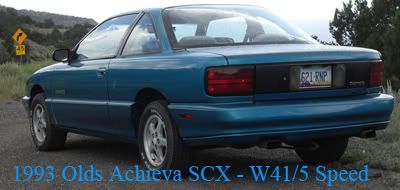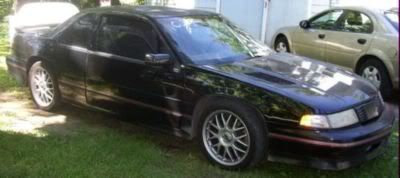Hello to all, and thank you in advance for your help.
I searched the threads for a similar problem to mine without any success, but found the members of this forum to be very helpful.
Car: 97 Pontiac GA 3.1L
Mileage: 151K
VIN: 1G2NE52M7Vc817481
I've owned this car 1.5 years and maintained it and fixed any minor problems. Prior to this problem, engine was running fine, no noises, and 22 mpg avg. One evening coming home, engine started missing every few seconds under load going up a steep hill (50mph). I immedietely slowed, and rolled back down the hill to a gas station. Checked vitals, oil, coolant, air filter, and found all full and in good condition. Started car again and let idle. Every few seconds, engine would miss, and time between misses eventually grew shorter, and engine quit. Engine would restart, but only stay running with throttle manipulation. Tried starting car again to limp home, but engine just quit. No loud bang, noises, or ticks. No leaks, noticeable blockages, or electrical shorts. Towed car home.
Checked spark on all 6 cyl, very good. Spark plug condition: very good. Opened Fuel rail check valve: fuel squirted out like crazy, but didn't use a guage to verify pressure. Replaced fuel filter anyway (since this part is easy to replace). At this point in time I believed the problem was in an electric module, so I towed it in town to a repair shop.
Initial repair shop told me, "found cylinders #4,5,6 with extermely low compression." Since this explanation didn't satisfy the immediate breakdown, or explain why the engine would start, but not stay running, I decided to get another opinion.
2nd repair shop (Pontiac Dealership) told me, "Hooked up scan tool, saw engine was misfiring on cyl 4,5,6, Performed compression ck on 2,4,5,6 Results as follows 2-140 psi, 4-95 psi, 5- psi, 6-90 psi. Need eng torn down & insp / repaired or new motor." I asked what the psi was on cyl 5, and they said 0.
I asked both repair shops what their best guess was as to the compression, and they both replied something mechanical, and probably not the head gasket.
Took car home, removed spark plugs again and found cyl 5 full of fuel, approx 1/2 cup after absorbing it out. I believe this was caused by repair shops conducting numerous compression tests and not burning fuel from cylinder. Used fiber optic light to inspect front bank of cylinders, and didn't see anything suspicious. Removed valve cover and manually checked actuation of valves and springs: all moved fine and appeared lubricated. Removed rockers from cyl 1 and 5 (assuming this would close the valves for sure). Used compressed air and nozzle at 30 psi and blew into cylinders. Cyl 1 would very slowly leak out. Cyl 5 leaked out very fast and into intake manifold (Air came blowing out of manifold). I believed at this time I might have a bent intake valve.
Removed head and cannot find ANYTHING that indicates pressure loss. Valves seated nicely against head and in good condition. No evidence of burnt rings, or scored cylinders. No holes or cracks in pistons, cylinders, or head. Gasket in fine condition.
What now??
Thank you.
Aaron
I searched the threads for a similar problem to mine without any success, but found the members of this forum to be very helpful.
Car: 97 Pontiac GA 3.1L
Mileage: 151K
VIN: 1G2NE52M7Vc817481
I've owned this car 1.5 years and maintained it and fixed any minor problems. Prior to this problem, engine was running fine, no noises, and 22 mpg avg. One evening coming home, engine started missing every few seconds under load going up a steep hill (50mph). I immedietely slowed, and rolled back down the hill to a gas station. Checked vitals, oil, coolant, air filter, and found all full and in good condition. Started car again and let idle. Every few seconds, engine would miss, and time between misses eventually grew shorter, and engine quit. Engine would restart, but only stay running with throttle manipulation. Tried starting car again to limp home, but engine just quit. No loud bang, noises, or ticks. No leaks, noticeable blockages, or electrical shorts. Towed car home.
Checked spark on all 6 cyl, very good. Spark plug condition: very good. Opened Fuel rail check valve: fuel squirted out like crazy, but didn't use a guage to verify pressure. Replaced fuel filter anyway (since this part is easy to replace). At this point in time I believed the problem was in an electric module, so I towed it in town to a repair shop.
Initial repair shop told me, "found cylinders #4,5,6 with extermely low compression." Since this explanation didn't satisfy the immediate breakdown, or explain why the engine would start, but not stay running, I decided to get another opinion.
2nd repair shop (Pontiac Dealership) told me, "Hooked up scan tool, saw engine was misfiring on cyl 4,5,6, Performed compression ck on 2,4,5,6 Results as follows 2-140 psi, 4-95 psi, 5- psi, 6-90 psi. Need eng torn down & insp / repaired or new motor." I asked what the psi was on cyl 5, and they said 0.
I asked both repair shops what their best guess was as to the compression, and they both replied something mechanical, and probably not the head gasket.
Took car home, removed spark plugs again and found cyl 5 full of fuel, approx 1/2 cup after absorbing it out. I believe this was caused by repair shops conducting numerous compression tests and not burning fuel from cylinder. Used fiber optic light to inspect front bank of cylinders, and didn't see anything suspicious. Removed valve cover and manually checked actuation of valves and springs: all moved fine and appeared lubricated. Removed rockers from cyl 1 and 5 (assuming this would close the valves for sure). Used compressed air and nozzle at 30 psi and blew into cylinders. Cyl 1 would very slowly leak out. Cyl 5 leaked out very fast and into intake manifold (Air came blowing out of manifold). I believed at this time I might have a bent intake valve.
Removed head and cannot find ANYTHING that indicates pressure loss. Valves seated nicely against head and in good condition. No evidence of burnt rings, or scored cylinders. No holes or cracks in pistons, cylinders, or head. Gasket in fine condition.
What now??
Thank you.
Aaron





 !!!!! BOSCH PLUGS RULE !!!!!
!!!!! BOSCH PLUGS RULE !!!!!






Comment